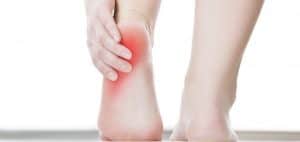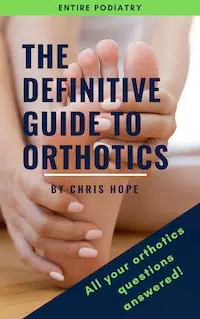What is plantar fasciitis? (pronounced plan-tar fa-she-i-tis)
Plantar fasciitis is the most common cause of heel and arch pain and one of the most frequent conditions we treat at Entire Podiatry.
Plantar fasciitis refers to an overuse injury of the plantar fascia, which is the fibrous band of tissue that connects the heel to the toes, creating the arch of the foot.
The plantar fascia is a very strong ligament, however it is also very prone to overuse as it is constantly working whenever we are standing or walking. Overuse of this ligament can cause it to becoming painful, inflamed, thickened, tight and weak.
Plantar fasciitis symptoms and signs
Plantar fasciitis can cause pain either underneath the heel, at the arch or both.
Typical symptoms of plantar fasciitis include:
- Pain and stiffness after long periods of being stationary, such as when you first get out of bed in the morning or after sitting for a long time. This pain tends to improve as your foot ‘warms up’.
- Increased pain in your heel or arch towards the end of the day.
- Tired feet at the end of the day.
- The pain can be sharp or dull and may also ache or burn. Some people describe a cramping-like sensation in their arch.
- The pain may be worse when without shoes on hard floors.
What causes plantar fasciitis?
There is no single cause of plantar fasciitis. There are many risk factors that may cause this ligament to be overused and painful. This is why it’s important to work with your podiatrist to assess your pain and foot function to understand what is causing your plantar fasciitis and to develop a personalised treatment plan. Some of the common causes of plantar fasciitis include:
The biomechanics of your feet.
This is the way that your feet work and the way that you walk:
- Flat feet that roll in too much (pronation). This causes elongation of the foot and places increased tension on the plantar fascia. This increased stress can result in inflammation and pain.
- High arched feet or feet that roll out too much (supination). This foot type is associated with tightness and tension of the plantar fascia.
- Tightness in your calves and Achilles tendon. This muscular tightness reduces the movement available at your ankle joint, which increases the tension on the plantar fascia.
- A previous injury may also affect the biomechanics of your foot. You may change your walking style, even without meaning to, in order to protect a current or old injury. This may be increasing the tension on the fascia.
Too much force going through your feet:
- Spending lots of time standing on your feet. Your plantar fascia is working hard even when you are standing still. Standing for long periods also puts lots of pressure through your heel.
- Heavy exercise loads. A quick increase in exercise levels can be too much for your plantar fascia to tolerate and the ligament can become overworked, tired and painful.
- Being overweight also puts more stress and strain through all the joints and structures in your feet including the plantar fascia.
- Pregnancy will also contribute to more weight being carried through your feet. This can overload the structures in your feet including the plantar fascia.
Footwear:
- Incorrect shoes for your foot-type. There is no ‘best shoe’ for everyone. Rather your ‘foot type’ will dictate the best type of shoe for you. The shoe that works best for someone you know might not necessarily be the best shoe for you or the best shoe to allow your ligament to heal. Very often we see people wearing good quality shoes but these shoes may not be correct for them. This is why it is important to have your podiatrist assess your shoes to advise if they are suited to your
- Worn out shoes. As shoes get old and fatigue they lose their cushioning and their support. In a worn-out shoe the foot does not function in an ideal way and this can cause excessive strain to be placed through the plantar fascia. Sometimes it is not easy to know if your shoe is ‘worn-out’ as it might wear out in ways you might not notice or expect. This is why it is important for your podiatrist to look at your shoes as part of their assessment.
- Ill-fitting shoes. Shoes that are even one size too big or too small can contribute to plantar fasciitis. Squeezing your foot into a shoe that is too small can increase the tension within the arch. If you are wearing a shoe that’s too big your foot tends to slide around inside and the muscles in your feet are overworked as they try and keep the shoe on your foot.
Medical specialists for plantar fasciitis
 Your podiatrist is an expert in plantar fasciitis and your feet. Seeing a podiatrist should be the first step when dealing with any foot problems, including heel or arch pain. The podiatrist will do more than just diagnose you with this condition; they will work with you to look in detail at your symptoms, your biomechanics, your footwear and your lifestyle to figure out the best and most effective way to treat your foot pain.
Your podiatrist is an expert in plantar fasciitis and your feet. Seeing a podiatrist should be the first step when dealing with any foot problems, including heel or arch pain. The podiatrist will do more than just diagnose you with this condition; they will work with you to look in detail at your symptoms, your biomechanics, your footwear and your lifestyle to figure out the best and most effective way to treat your foot pain.
Other medical specialists may include an orthopaedic/podiatric surgeon or an orthopaedic specialist. However an orthopaedic specialist is usually only required if the pain is unable to be treated with podiatry treatment. This is quite rare and generally is only needed as a last resort.
A radiologist and a radiographer may be required to take an x-ray or a diagnostic ultrasound of your foot. There are a few reasons why your podiatrist may refer you for radiographic images of your foot e.g. if they are unsure of the specific cause of your pain, to rule out the presence of other conditions, such as a tear of the plantar fascia or a fracture, or to see how your condition is progressing.
A radiologist will also be the medical specialist to administer corticosteroid injections if this is required.




